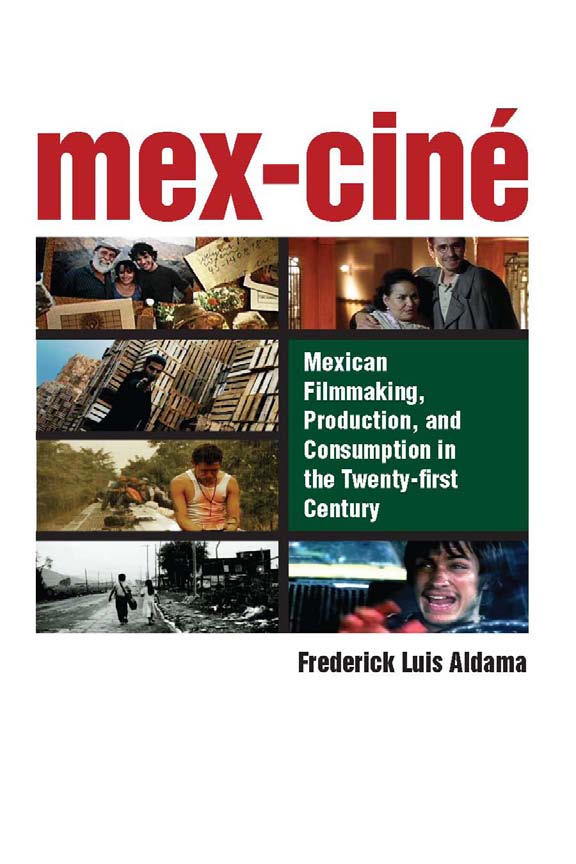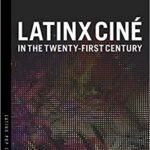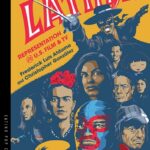Mex-Ciné

Buy
Mex-Ciné offers an accessibly written, multidisciplinary investigation of contemporary Mexican cinema that combines industrial, technical, and sociopolitical analysis with analyses of modes of reception through cognitive theory.
https://professorlatinx.la.utexas.edu/wp-content/uploads/2017/07/Mex-Cine-cover-200×300.jpg
Mex-Ciné aims to make visible the twenty-first century Mexican film industry, its blueprints, and the cognitive and emotive faculties involved in making and consuming its corpus. A sustained, free-flowing book-length meditation, Mex-Ciné enriches our understanding of the way contemporary Mexican directors use specific technical devices, structures, and characterizations in making films in ways that guide the perceptual, emotive, and cognitive faculties of their ideal audiences, while providing the historical contexts in which these films are made and consumed.
What The Critics Say
Aztlán: A Journal of Chicano Studies
This formidable account analyzes the first decade of twenty-first-century Mexican film, examining production, exhibition,and reception through a perceptive lens. In particular, Aldama uses the concept of the filmic blueprint to provide critical analysis and evaluate the quality of specific films. He addresses the obstacles that Mexican directors face and the effects of being in close proximity to the United States and especially Hollywood.
In analyzing films, Aldama tends to focus on how the story is told more than on the story itself. While he takes narrative into account, his profound knowledge of process allows him to show how the story is affected by filmic techniques. . . .
A precise writer with a vast knowledge of Mexican film, Aldama mentions specific examples to validate his arguments and points out anomalies in his findings in order to avoid overgeneralization. He praises certain aberrations in Mexican filmmaking as innovative and fresh additions to an industry whose output is often banal. . . .
Commenting on the influence of cultural specificity on film, he states, “Born and raised by families in Mexico, Mexican filmmakers acquire tastes that involve their total sensory system and its particularized education within a Mexican cultural, social, political, and historical context” (27).This key statement serves to clarify that while all directors are ultimately“human,” regional upbringings play crucial roles in filmmaking. For Aldama, defining films as “Mexican” (or any nationality) is a complex process.Perhaps, then, it can be stated that Aldama does not wish to diminish any sense of Mexican or Chicano identity, but rather to demystify it and boil it down to individual experience. . . .
In sum, the prolific Aldama presents an insightful account of twenty first-century Mexican cinema that touches on industrial, technical, and sociopolitical aspects of the industry. Distinguishing the text is its use of cognitive science in its filmic analysis. Furthermore, Aldama is unafraid to use systematic analysis to judge films, based upon their blueprints, as successes or failures. Such judgment is key, for it puts his critical theories to the test and forces him to actively apply these theories rather than to merely formulate them. His assertions about local and international filmmaking can be used to both justify and demystify Chicano filmmaking and identity. Written in readable language, Mex-Ciné is sure to appeal to both serious scholars and casual students of film.
Chasqui
El libro de Aldamaes un textocríticomuy personal sobre la produccióncinematográficamexicana del siglo XXI. Aldamaoptapor la crítica total, la queabarcatodos los aspectos deltextocinematográfico: la composición del plano, el montaje, el movimiento de cámara y laangulación, la iluminación, los escenariosnaturales y de estudio, y sobretodo, la aceptación delconcepto de director implícito, como últimaentidadqueintentadarcoherencia al conjunto deltextocinematográfico. Este director implícito tiene un plan de acciónquesegún David Bordwellsirveparaque la audienciapuedadarlesentido a la narrativa. Aldamaestudiatambiéncómo elespectadorsuple los huecos en la narrativa y reacciona ante el multiperspectivismoinherente allenguajecinematográfico.Otrastécnicas a las que hay queprestarleatención son la cámaralenta,el narrador no fiable, la voz en off, el documentalismo—esdecir, la apariencia de documentalquepuedatenerunaobra de ficción—, los saltos en el montaje, el uso del corte suave o abruptoy el audio quepuedesubrayar la acción o distorsionarla a conciencia. La actuación en el cine y elmovimiento corporal de los actoresmerecentambién la atención del crítico. Conceptostradicionales como el tiempo y el espaciotambiéntienenqueestar en el centro del análisis. . . .
Trasesteprólogotécniconecesario, Aldamatrataalgunostemasmarco del cine mexicano del sigloveintiuno como la frontera, el pasohacia elotrolado y la representación del otro. El cine también tiene uncomponente moral que hay queconsiderar. Aldamadedica un bloqueimportante de sutrabajo al problema de la producción y dela exhibición y de la hibridación del producto de ficción audiovisual unavezque las productorashacentanto cine como televisión. Estoinfluye en la capacidadcrítica del cine. La última partedel libroes la importante y trata de lo queAldama llama “refrito,” “buenaonda” y “bubblegum.
Richard Gordon, Director of the Latin American and Caribbean Studies Institute, University of Georgia, and author of Cinema, Slavery, and Brazilian Nationalism
The prodigious Aldama has done it again. He brings his trademark smarts, panache, and innovation to Mex-Ciné—a tour de force that takes us into the subterranean recesses of the creative and consumptive mind in its making of and interfacing with contemporary Mexican cinema. Drawing on current research on film and cognition, Aldama plants his feet firmly in the first decade of Mexican films made in the 21st century. Then he nimbly guides us on a journey whereby we learn about the processes at work in creating, viewing, and evaluating cinematic narratives. At once precious and persuasive Aldama charts new routes for understanding the interrelationship between Mexican cultural specificity and human universality. Aldama has done for Mexican cinema what Bordwell did with Poetics of Cinema: with grace and ease he imparts deep knowledge of the human mind in its creativity and reception as well as smelts anew powerfully keen tools that enlarge radically our understanding of Mexican cinema, film studies, and cognitive approaches to culture generally.
William Anthony Nericcio, San Diego State University
Mex-Ciné provides researchers, filmmakers, film students, and the general reader alike with a document that situates them in the present, vibrant world of Mexican cinema. Aldama’s work takes the pulse of that evolving field even as it enacts sage, critical interventions and sensitive, evocative analyses that push it forward.
Camilla Fojas, DePaul University
Mex-Ciné offers a thoroughly engaging and unique approach to the topic of contemporary Mexican cinema that combines industrial, technical, and socio-political analysis with analyses of modes of reception through cognitive theory. This illuminating and convincing work will no doubt pave a new direction in Mexican film studies.
Carl Plantinga, Calvin College
In Mex-Ciné, Frederick Luis Aldama not only puts recent Mexican films into their historical, cultural, and industrial contexts, but analyzes the films as ‘blueprints’ designed to elicit patterns of thought and emotion in viewers. The book is both an incisive account of Mexican cinema of the last decade, and more broadly, a compelling theory of narrative cinema itself.
Where To Buy
From Amazon | From University of Michigan Press | From Barnes & Noble


